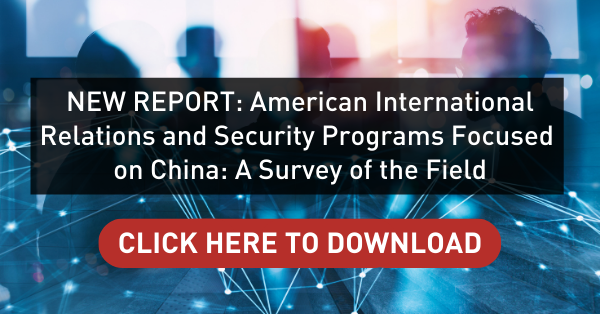NEW YORK CITY, August 12, 2021 – The National Committee on United States-China Relations is pleased to announce the publication of a report based on a survey of leading American academic centers, think tanks, and NGOs on China-related issues. The report was commissioned by Carnegie Corporation of New York.
The survey, conducted in late 2020, was sent to 125 leading think tanks, academic centers, and NGOs to assess the state of China-focused international relations and peace and security programs in the United States. The 82 responses present a snapshot of the field in an era of global disruption, instability, and growing Sino-American tensions. A summary of the key findings is outlined below and in an interview with National Committee Senior Program Officer Rosie Levine.
The key findings include the following:
- Demand for China content is growing in the United States, leading to an increase in opportunities for the academic community.
- In China, domestic tightening has limited information flows, influencing the topics that can be addressed productively, diminishing the exchange of ideas and effective collaboration.
- In America, institutions and scholars focused on China are increasingly caught in the political crossfire, which limits their ability to conduct research and programming effectively.
- The downturn in the bilateral relationship has politicized work on China, resulting in diminishing quality of the discourse in both countries.
- In the current U.S. environment, many China-related topics are viewed through a security lens, resulting in China being reduced to a target in U.S. domestic rhetoric.
The surveyed organizations have traditionally played an important role in shaping the understanding of China among American policymakers, academics, and the general public; yet today, they face increasing pressure when doing so. Due to new dynamics present in the U.S.-China relationship, scholars and practitioners will have to find ways to navigate and manage increasingly hostile environments in and between both countries, effectively manage risks, and endure increased scrutiny of their organizations’ outputs.
Over the past 25 years, the National Committee on United States–China Relations has written five similar survey-based reports that provide an overview and analysis of the China-field in America. Since the National Committee was founded in 1966, it has believed that vigorous debate of China policy among Americans is essential and that balanced public education can clarify U.S. interests and strengthen foreign policy. In this spirit, the findings from this survey underscore the importance of protecting the work of American scholars and practitioners who conduct high quality research, analysis, and programming on China.
Report
Download a copy of the report here.
Interview
National Committee Senior Program Officer Rosie Levine explores the key findings from the report and the broader implications for the U.S.-China relationship.
About NCUSCR
The National Committee on U.S.-China Relations is the leading American nonprofit, nonpartisan organization devoted exclusively to building constructive and durable relationships between the United States and Greater China. Since 1966, the National Committee has focused its exchange, educational, and policy programs on politics and security, governance and civil society, economics and finance, education, and transnational issues such as energy and the environment, addressing these issues with respect to mainland China, Hong Kong, and Taiwan. The Committee’s membership includes more than 900 prominent Americans from all parts of the country, and 80 corporations and professional firms. They represent many viewpoints, but share the belief that productive U.S.-China relations require ongoing public education, face-to-face contact, and the forthright exchange of ideas.
For press inquiries, please contact:
Joseph Weed
Director of Communications
jweed@ncuscr.org 646-604-8001
